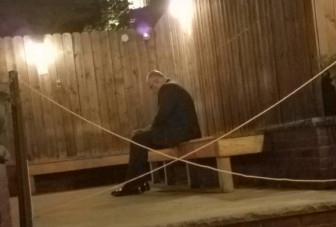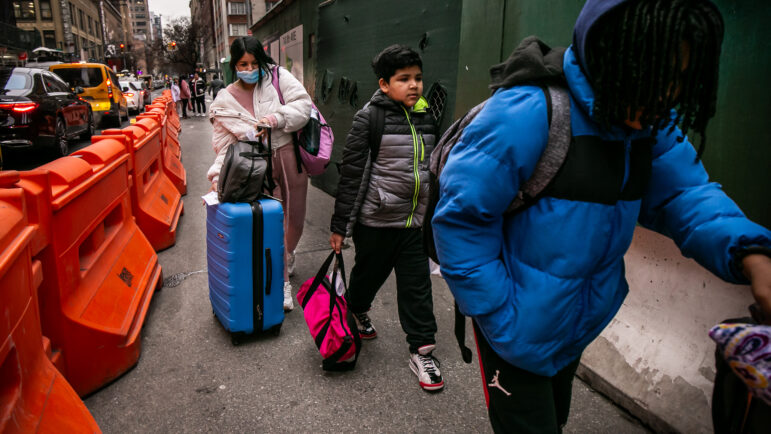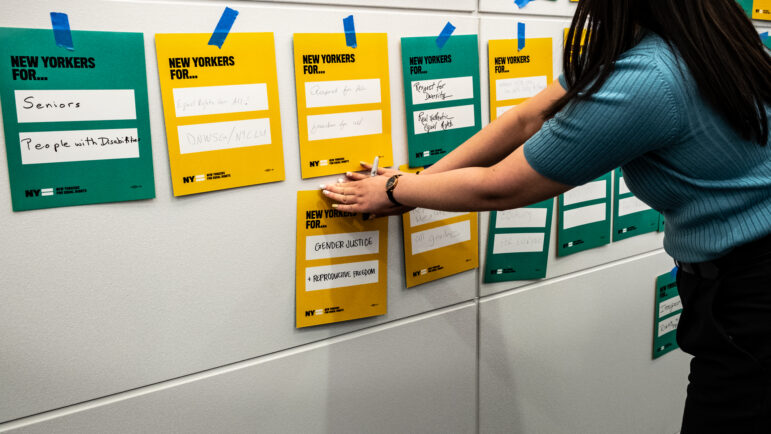
Jarrett Murphy
The mayor and first lady take the stage after three in four city Democrats endorsed his quest for a second term,
In the wake of a victory that was both commanding and expected, Bill de Blasio spoke Tuesday night about the theme that would guide his second term if he beats Republican nominee Nicole Malliotakis in November: a quest for fairness that pits the mayor against the status quo.
“I want to make clear that no matter how much I love this place, no matter how much good I’ve seen, I do not accept the status quo in this town. We’ve got more to do, my friends. We’ve got more to do,” the mayor said as a multi-ethnic crowd of supporters arrayed behind him held red campaign signs bearing the slogan “This is your city.”
“I’m not going to stop until we’ve built that fairer city,” the mayor, with First Lady Chirlane McCray at his side, continued. “We’ve begun the change but more change is needed.”
Most of the policy ideas de Blasio mentioned—the millionaire’s tax, discount transit fares for low-income people, the 3-K program, a mansion tax—are proposals he has already made. He does have eight weeks to unveil some new ones.
Last night, however, the mayor spoke not with policy detail but rather with unusual passion and even waxed poetic, with a quote from Pablo Picasso: “Everything you imagine is real.” That was the lesson, de Blasio said, of his come-from-behind victory in 2013 and the success he’s enjoyed in creating universal pre-K and reducing stop-and-frisk encounters while driving crime down further. “These things happened because we all imagined them,” de Blasio said.
Preliminary figures showed de Blasio winning 74 percent of the vote. Sal Albanese took 15 percent, Michael Tolkin just under 5 percent, Bob Gangi 3 percent and Richard Bashner 2.4 percent
De Blasio called his victory “resounding,” and it was. He took 72 percent of the vote. It was the first time a sitting Democratic mayor had faced a primary since David Dinkins prevailed over two rivals in 1993–because of course, that was the last time there was a sitting Democratic mayor.*
De Blasio did have a huge financial advantage against his four primary rivals, outspending Albanese by 14 to 1. Turnout was horrible: Preliminary figures suggest it was about 14 percent, with a quarter million fewer people participating than did in the 2013 primary.
Maybe those facts diminish the mayor’s victory in some people’s view, but those factors are likely to repeat themselves in the general election as well. Eventually, if the resentment of de Blasio that we hear so much about is real, one would expect it to put on its shoes and walk to the polls on election day. As the saying goes, ball don’t lie. Despite the dramatically lower number of total votes, de Blasio personally won 44,000 more votes this year than in the 2013 Democratic contest.
Earlier in the day, campaigning along Queens Boulevard, Albanese had predicted a 30 percent finish, based on anecdotal evidence he’d received over the final two days of campaigning.

Jarrett Murphy
Albanese during a private moment at his Park Slope election-night headquarters.
But by 8 p.m., as he and a group of supporters gathered at a restaurant in Park Slope, Albanese seemed resigned to a less impressive performance. He stepped into a roped-off section of the restaurant’s back patio, apparently to compose his remarks for the evening, then warmly greeted running mate and public advocate candidate David Eisenbach, who netted a respectable 24 percent of the voter against incumbent Letitia James. Albanese will be on the general election ballot as the Reform Party candidate, and that party’s leader, Curtis Sliwa, was on hand with a few red-jacketed and beret-wearing members of the Guardian Angels.
Two hours later on the stage at a venue on Atlantic Avenue, de Blasio—in an odd break from custom—did not thank, or even acknowledge, any of his rivals in his victory speech.
In his remarks, the mayor looked back upon the reduction in stop and frisk, the two-year rent freeze and the creation of a right to counsel in housing court in his first term, and talked about his plan to create 100,000 good paying jobs in his second. The mayor did not focus on his affordable housing plan, the effort to close Rikers Island or the homeless crisis. He said he was inspired by a slogan from the early 20th century populist movement: “Pass prosperity around.”
“It’s not a new idea, but it’s the right idea,” he said. Because of the emerging 3-K program, he added, “We are going to have a generation of kids who are brought up the right way with every opportunity opened up to them. Think about that, friends. Think about everybody getting the same start.”
The tone of the speech hinted that the mayor doesn’t plan to win re-election merely by noting that his opponent voted for Donald Trump. It indicated that de Blasio plans to offer a fresh vision, rather than just presenting the resume of his first term. It’s not clear how much detail he’ll add to the picture.
During the last campaign and early in his mayoralty, de Blasio often talked in similar, sweeping terms to the ones he employed on Tuesday night, frequently dropping the words “extraordinary” and “transformative” to describe the changes he was seeking or achieving. That had the effect of setting goals in rhetoric that were hard to match with reality, even though some of the changes de Blasio achieved were very significant. Critics of the mayor have said that the continuation of “broken windows” policing and a housing plan that relies heavily on private developers or subsidizes apartments for households with incomes over $100,000 reflect a continuation, rather than a rejection, of the status quo.
His speech on Tuesday seemed to raise the bar again. Maybe his plan is to meet it this time.
“You’ll meet some doubting Thomases,” he warned, a Biblical reference. “We don’t get limited by other people’s ideas of what’s possible and what’s not. We create our own reality in New York City, don’t we?”
*Correction: The initial version of this post indicated that 1989 was the last primary.









One thought on “De Blasio Claims Primary Victory and Sets Theme for a Second Term”
The middle-class is doomed. NYC sales taxes, income taxes and most of all property taxes will have to increase massively to pay for all of deBlasio’s socialist dreams.